Idioventricular rhythms - Study guides, Class notes & Summaries
Looking for the best study guides, study notes and summaries about Idioventricular rhythms? On this page you'll find 235 study documents about Idioventricular rhythms.
Page 2 out of 235 results
Sort by
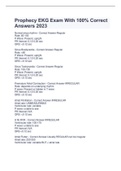
-
Prophecy EKG Exam With 100% Correct Answers 2023
- Exam (elaborations) • 6 pages • 2023
-
Available in package deal
-
- $10.99
- 1x sold
- + learn more
Prophecy EKG Exam With 100% Correct Answers 2023 Normal sinus rhythm - Correct Answer-Regular Rate: 60-100 P Wave: Present, upright PR Interval: 0.12-0.20 sec QRS: <0.12 sec Sinus Bradycardia - Correct Answer-Regular Rate: <60 P Wave: Present, upright PR Interval: 0.12-0.20 sec QRS: <0.12 sec Sinus Tachycardia - Correct Answer-Regular Rate: 100-150 P Wave: Present, upright PR Interval: 0.12-0.20 sec QRS: <0.12 sec Premature Atrial Contraction - Correct Answer-IRREGUL...
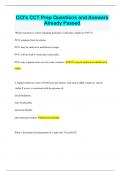
-
CCI's CCT Prep Questions and Answers Already Passed
- Exam (elaborations) • 47 pages • 2024
- Available in package deal
-
- $11.99
- + learn more
CCI's CCT Prep Questions and Answers Already Passed Which statement is correct regarding premature ventricular complexes (PVCs)? PVCs originate from the atrium. PVCs may be unifocal or multifocal in origin. PVCs will not lead to ventricular tachycardia. PVCs only originate from one site in the ventricles. PVCs may be unifocal or multifocal in origin. A regular rhythm at a rate of 40-60 beats per minute, with narrow QRS complexes, and no visible P waves, is consistent with the pre...
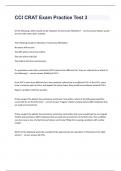
-
CCI CRAT Exam Practice Test 3 with correct answers rated A+
- Exam (elaborations) • 17 pages • 2024
- Available in package deal
-
- $17.99
- + learn more
CCI CRAT Exam Practice Test 3Of the following, which would not be indicative of ventricular fibrillation? - correct answer Waves would be seen with every other complex The following would be indicative of ventricular fibrillation: No waves will be seen The QRS will be more than 120ms The rate will be 100-250 The patient will lose consciousness If a premature ventricular contraction (PVC) comes from different foci, they are referred to as which of the following? - correct answer Multi...
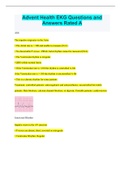
-
Advent Health EKG Questions and Answers Rated A
- Exam (elaborations) • 20 pages • 2023
-
Available in package deal
-
- $9.49
- 1x sold
- + learn more
Advent Health EKG Questions and Answers Rated A Afib The impulse originates in the Atria • The Atrial rate is > 300 and unable to measure [N/A] • No discernable P waves - PRI & Atrial rhythm cannot be measured [N/A] • The Ventricular rhythm is irregular • QRS within normal limits • If the Ventricular rate is <100 the rhythm is controlled A-fib; if the Ventricular rate is > 100 the rhythm is uncontrolled A-fib • This is a chronic rhythm for some patients Treatment: controlle...
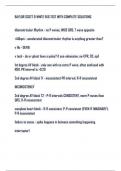
-
BAYLOR SCOTT & WHITE EKG TEST WITH COMPLETE SOLUTIONS
- Exam (elaborations) • 3 pages • 2024
-
Available in package deal
-
- $20.49
- + learn more
BAYLOR SCOTT & WHITE EKG TEST WITH COMPLETE SOLUTIONS Idioventricular Rhythm - no P waves, WIDE QRS, T wave opposite <40bpm - accelerated idioventricular rhythm is anything greater than? v fib - DEFIB v tach - do ur ghost have a pulse? if yes-adenosine, no-CPR, O2, epi! 1st degree AV block - only one with no extra P wave, often confused with NSR, PR interval is >0.20 2nd degree AV block T1 - inconsistent PR interval, R-R inconsistent INCONSISTENCY 2nd degree AV block T2 - P-R ...
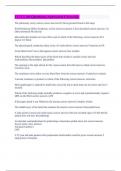
-
CCT || All Questions Answered Correctly.
- Exam (elaborations) • 12 pages • 2024
-
Available in package deal
-
- $10.79
- + learn more
The pulmonary artery carries correct answers D) Deoxygenated blood to the lungs Wolf-Parkinson-White Syndrome, a form of pre-excitation is best described correct answers -A) Delta shortened PR interval Idioventricular rhythms are most often seen in which of the following: correct answers D) 3 degree AV block The physiological conduction delay at the AV node allows correct answers Ventricles to fill Atrial flutter has P waves that appear correct answers Saw toothed Which describes ...
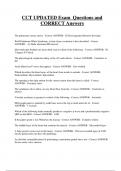
-
CCT UPDATED Exam Questions and CORRECT Answers
- Exam (elaborations) • 13 pages • 2024
- Available in package deal
-
- $8.49
- + learn more
CCT UPDATED Exam Questions and CORRECT Answers The pulmonary artery carries - Correct ANSWER- D) Deoxygenated blood to the lungs Wolf-Parkinson-White Syndrome, a form of pre-excitation is best described - Correct ANSWER- -A) Delta shortened PR interval Idioventricular rhythms are most often seen in which of the following: - Correct ANSWER- D) 3 degree AV block The physiological conduction delay at the AV node allows - Correct ANSWER- Ventricles to fill Atrial flutter has P waves tha...
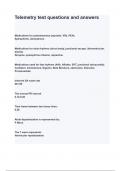
-
Telemetry test questions and answers
- Exam (elaborations) • 5 pages • 2024
-
Available in package deal
-
- $7.99
- + learn more
Telemetry test questions and answers Medications for pulselessness (asystole, Vfib, PEA): Epinephrine, Amiodarone Medications for slow rhythms (sinus brady, junctional escape, idioventricular, blocks) Atropine, epinephrine infusion, dopamine Medications used for fast rhythms (Afib, Aflutter, SVT, junctional tachycardia): Cardizem, Amiodarone, Digoxin, Beta Blockers, adenosine, lidocaine, Procainamide Inherent SA node rate 60-100 The normal PR interval 0.12-0.20 Time frame between tw...
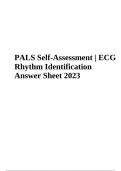
-
PALS Self-Assessment | ECG Rhythm Identification Answer Sheet 2024
- Exam (elaborations) • 39 pages • 2024
-
Available in package deal
-
- $17.99
- + learn more
PALS Self-Assessment | ECG Rhythm Identification Answer Sheet 2024. Pediatric Rhythms (core PALS rhythms A to H; non-core rhythms I to M): A. Normal sinus rhythm B. Sinus tachycardia C. Sinus bradycardia D. Supraventricular tachycardia (SVT) E. Wide-complex tachycardia; presumed ventricular tachycardia (monomorphic) F. Ventricular fibrillation (VF) G. Asystole H. Pulseless electrical activity (PEA) I. SVT converting to sinus rhythm with adenosine administration J. Wide-complex tachycar...
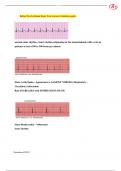
-
Relias Dysrhythmia Basic Test Answers Solution guide 2023.
- Exam (elaborations) • 12 pages • 2023
-
- $7.99
- + learn more
Relias Dysrhythmia Basic Test Answers normal sinus rhythm heart rhythm originating in the sinoatrial node with a rate in patients at rest of 60 to 100 beats per minute Sinus Arrhythmia Appearance is ALMOST NORMAL: Respiratory – Circulatory interaction Rate INCREASES with INSPIRATION (IN=IN) Sinus Bradycardia <60 normal sinus rhythm Sinus Tachycardia >100 (100-150) normal sinus rhythm Premature Atrial Contraction (PAC) Heart Rate: Depends on underlying rhythm Regularity: Interrupts the re...

Do you wonder why so many students wear nice clothes, have money to spare and enjoy tons of free time? Well, they sell on Stuvia! Imagine your study notes being downloaded a dozen times for $15 each. Every. Single. Day. Discover all about earning on Stuvia


